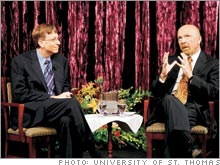|
The school of hard knocks
What two empire builders wish they had learned in the classroom.
NEW YORK (FORTUNE Small Business) - Meeting great entrepreneurs is one of the advantages of attending an entrepreneurship program. Students at the University of St. Thomas, for instance, recently had a chance to soak up some hard-won lessons from Microsoft's Bill Gates and Richard Schulze, founder of electronics retailer Best Buy, at a session moderated by Christopher Puto, dean of the St. Thomas College of Business, and venture capitalist Ann Winblad, co-founder of Hummer Winblad. Here's an excerpt of their comments:
PUTO: What do you know now that you wish you had known 30 years ago? GATES: Early in the history of Microsoft, our view was, if you were very smart then you could learn how to manage people, how to do business, how to do marketing. It turns out that talent isn't that fungible. Somebody who is great at doing software in many ways is often not the right person to manage people. I think the thing to recognize is these different kinds of ability, and to think through, as you build a team, "How do you get the right mix?" SCHULZE: At first I was hesitant to go outside and bring in external know-how. Back in the mid-'90s, when we had issues around our supply chain, we needed to get some real skill brought in -- people at the top of the pyramid in their fields -- to be partners. Strategic partnering has now become an extremely important part of how we do business. We now realize we don't have a monopoly on all the ideas. WINBLAD: A student has asked, "What do you do in your corporations to spur new and innovative ideas?" SCHULZE: In the older days, when someone had an idea, if he managed to get it through the store manager, the district manager, the regional manager, and someone in marketing, there might be some opportunity to review it. This was a long timeline. Now we give license to employees on the floor to experiment with new concepts, offerings, products, and services. WINBLAD: If you were a freshman in the audience, what would you be contemplating for your future? GATES: I see two areas that are changing very rapidly. Information technology continues to stun people with the rate of improvement. The second area is medicine and biology, where we really can make breakthroughs on diseases and extend the expected life span for people. Understanding genetic information and the tools around that are just at the beginning. Those are two areas where there will be the most phenomenal successes, and they will be very exciting to be involved with, because they are such change agents. ___________________ More on entrepreneurship from FORTUNE Small Business:
To write a note to the editor about this article, click here. |
| ||||||||||||||||||||||||||||||||||

